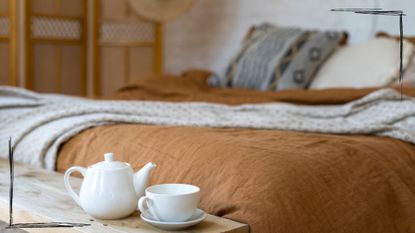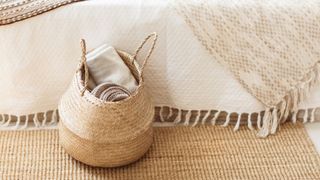What are the softest sheets made from and expert tips on how to keep them that way
What are the softest sheets? From Egyptian cotton to silk, the experts reveal which sheets to pick for a cozy and comfortable night's sleep


Wondering what are the softest sheets for the best night's sleep? Well, you might not be surprised to know that picking the softest sheets off the shelf is only half the battle. Once you get them home, it's all about knowing the tried and tested tricks to keep them that way.
While the comfiness of the best mattresses and the plumpness of the best pillows play a huge part in the quality of your shut-eye, part of how to sleep better is ensuring that your bedsheets are good quality.
It's important that your sheets contribute towards your comfort, both for their softness and for their tog–ensuring that you're not getting too hot overnight or too cold.
Thread count plays a key part in this decision, but if you want the softest sheets on your bed, it's the material that really matters.
What are the softest sheets made from?
When deciding on a material for your bed linen, there are certain types that will give your sheets that super soft feel. While hotel beds typically use percale sheets to give that clean, crisp finish that's widely associated with the iconic hotel tuck method—also known as hospital corners—these materials aren't the softest to sleep on or the easiest to work with.
Sleep expert Jasmin Lee from Eachnight.com says that, while many people focus on the thread count, the type of material used can be even more important than the number when it comes to how a sheet feels to the touch. Therefore, it’s important for shoppers to understand what their preferences are.
"Sheets typically have a percale or sateen weave. Percale is a tighter weave with a light, crisp feel, while sateen is generally regarded as softer, silkier, and more luxurious," she explains. "However, sheets with a sateen weave tend to cost more than percale sheets." It's worth noting that percale sheets can also significantly soften over time, if you're willing to wait for the softness, rather than pay a higher price.
Sign up for the woman&home newsletter
Sign up to our free daily email for the latest royal and entertainment news, interesting opinion, expert advice on styling and beauty trends, and no-nonsense guides to the health and wellness questions you want answered.
These are the five softest fabrics when it comes to bed sheets:
Sateen Cotton
"Typically, bed linens are woven into two popular weaves: percale (cool and crisp) or sateen (soft and silky)," says James Montgomery-Castle, Senior Assistant Buyer at Soak&Sleep. "If you're looking for the softest bed linen, sateen is the way to go,"
He also pointed out that, due to its weaves, sateen has a subtle sheen that will make the sheets look (as well as feel) extra luxurious.
The Sleep Foundation describe the sateen weave for sheets as follows: "Sateen refers to a weave pattern rather than a material. This weave uses a one yarn under, three or four yarns over pattern. This gives it a heavier feel than some other weaves, like percale, and sleepers may feel this weightiness makes the sheets seem especially luxurious. It also makes them somewhat warmer, so they may be ideal for people who sleep cool or who live in cold climates."
Egyptian Cotton
Perhaps one of the most popular and widely known materials for bed sheets, Egyptian Cotton is a firm favorite in many homes. Grown along the Nile River Valley, this type of cotton produces the finest, longest staples and has been used for over 140 years.
As it's hand-picked, Egyptian cotton is extremely durable and hasn't had any added stress on the fibers, leaving them straight and fully intact, as opposed to other methods. The fibers tend to get softer after each wash, and as a result Egyptian Cotton sheets normally come with a luxury price tag thanks to their softness and durability.
Linen
Although not the easiest material to work with at first, linen sheets do tend to soften up over time. Made from the fibers that naturally grow as part of a flax plant, linen sheets dry faster than cotton, are cool and breathable, and give that signature crisp and clean finish you often see in hotel beds.
Linen sheets aren't to everyone's taste, and their propensity to crease easily puts lots of people off. However, linen sheets can be the softest sheets in the shops - especially if you get good quality ones.
As sustainable linen bed sheet company Piglet in Bed explains: "As well as being exceptionally soft, linen's natural long fibres help to regulate your body temperature as you sleep with its breathability and high moisture absorbency. It's also perfectly weighted which helps to ease you into a wonderful deep sleep. Linen is perfect for every season - fresh in the summer and warm in the winter. Another great quality of linen bedding is that it gets softer and softer with wear."
Flannel
Extremely popular throughout the colder months, flannel sheets are soft-to-touch and will keep you warm and toasty night after night.
According to bed brand Casper: "Flannel sheets are often made with cotton, but they can also be made from wool, fiber blends, or synthetic fibers like polyester.
"A technique called “napping” is what gives flannel its slightly fuzzy texture. After it’s woven, the fabric is brushed (on both sides or just one) to raise fine fibers. The napping process is what gives flannel its signature warmth and softness."
Silk
Silk pillowcases are renowned for their skin and hair care benefits, so why not extend this to the rest of your body with silk bed sheets? Although typically more expensive, the smoothness, coolness, and, well, silky softness of silk is well worth the investment—in addition to the beauty benefits.
When real women revealed the impact of a silk pillowcases and bedding on their night's sleep, they said that apart from the softness of the sheets, they noticed a difference in their hair and skin health - as well as remarking on better temperature control at night.
Expert tips on caring for sheets to keep them soft
1. Storage matters

“Storage impacts the preservation of cotton linens because it is a natural fiber," explains Marissa. "You want to store your linens somewhere where they can breathe and not be surrounded by plastic – i.e. do not store linens in plastic bins or keep them wrapped in plastic bags.” This will help keep them in the best condition and softer for longer.
2. Skip the fabric softener

It may sound counter-intuitive, but fabric softener could actually be making your sheets harder and starchier - rather than softer.
James Montgomery-Castle of Soak&Sleep explains: "Fabric softener actually clings to fabrics by applying a very fine waxy layer to the fibers to protect them and make them softer during the laundry process, but this also stops them from being as absorbent and breathable as when they were new. You’ll notice on activewear the labels often say not to use fabric softener because it reduces the garment’s ability to wick away moisture when sweating, and the build-up actually absorbs body odor making stains and smells difficult to remove over time. The same will happen to your bed linen."
3. Wash your sheets on a cold cycle

Keep your sheets softer for longer by avoiding those hot wash cycles and opting for a cold wash instead. This is not only better for your sheets, but it's better for the planet, too.
"Instead of using fabric softener, which can degrade the material, we recommend washing new sheets on a gentle cycle with cold water and an added cup of baking soda," suggests sleep expert Jasmin Lee. "You may also find that leaving your new sheets to soak in water with a cup of salt helps to soften them immensely. Lastly, detergent residue can also make older sheets feel stiff instead of soft. If you find that to be the case, try washing your sheets with half a cup of white vinegar."
4. Change your sheets every week

Do you change your sheets often enough? According to James, they should be left on your bed for a maximum of one week before switching. After all, what's better than getting into a freshly changed bed?
"I recommend changing your bed linen every 5-7 days to keep things fresh and clean which will help avoid sweat and grease build up over time," he tells woman&home.
See our guide on how to wash pillows properly and how to clean a mattress too, for a fresh, clean and healthy bed space all year round.
After watching 13 Going on 30 one too many times, Emma decided that she wanted to be a journalist and studied Multimedia Journalism at the University of Salford. She started her career as a fashion copywriter before delving into the world of digital journalism and her published work can be found in the likes of woman&home, Cosmopolitan, Metro, i-D and Apartment Therapy. Emma writes about interior design, travel, film and television, celebrities, and internet culture.
-
 Stop the search, Helen Skelton's ruby red sequin skirt is the only festive party piece you need this season
Stop the search, Helen Skelton's ruby red sequin skirt is the only festive party piece you need this seasonHelen Skelton brought all the seasonal glamour to her latest outfit must-have - and we're on the hunt for an identical ruby red shimmering skirt of our own.
By Lucy Wigley Published
-
 Carole Middleton's chunky roll neck with jeans is the go-ahead we needed to embrace casual knits for the rest of the year
Carole Middleton's chunky roll neck with jeans is the go-ahead we needed to embrace casual knits for the rest of the yearCasual, cosy and timelessly stylish is exactly what a chilly day jumper and jeans combination should be
By Caitlin Elliott Published